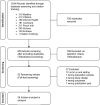Smoking Cessation Interventions and Abstinence Outcomes for People Living in Rural, Regional, and Remote Areas of Three High-Income Countries: A Systematic Review
- PMID: 37338988
- PMCID: PMC10475608
- DOI: 10.1093/ntr/ntad098
Smoking Cessation Interventions and Abstinence Outcomes for People Living in Rural, Regional, and Remote Areas of Three High-Income Countries: A Systematic Review
Abstract
Introduction: Tobacco smoking rates in high-income countries are greater in rural, regional, and remote (RRR) areas compared to cities. Yet, there is limited knowledge about interventions targeted to RRR smokers. This review describes the effectiveness of smoking cessation interventions for RRR smokers in supporting smoking abstinence.
Aims and methods: Seven academic databases were searched (inception-June 2022) for smoking cessation intervention studies to include if they reported on RRR residents of Australia, Canada, or the United States, and short- (<6 months) or long-term (≥6 months) smoking abstinence outcomes. Two researchers assessed study quality, and narratively summarized findings.
Results: Included studies (n = 26) were primarily randomized control (12) or pre-post (7) designs, from the United States (16) or Australia (8). Five systems change interventions were included. Interventions included cessation education or brief advice, and few included nicotine monotherapies, cessation counseling, motivational interviewing, or cognitive behavioral therapy. Interventions had limited short-term effects on RRR smoking abstinence, decreasing markedly beyond 6 months. Short-term abstinence was best supported by contingency, incentive, and online cessation interventions, and long-term abstinence by pharmacotherapy.
Conclusions: Cessation interventions for RRR smokers should include pharmacotherapy and psychological cessation counseling to establish short-term abstinence, and identify effective means of maintaining abstinence beyond 6 months. Contingency designs are a suitable vehicle for psychological and pharmacotherapy support for RRR people who smoke, and intervention tailoring should be explicitly considered.
Implications: Smoking disproportionately harms RRR residents, who can encounter access barriers to smoking cessation support. High-quality intervention evidence and outcome standardization are still required to support long-term RRR smoking abstinence.
© The Author(s) 2023. Published by Oxford University Press on behalf of the Society for Research on Nicotine and Tobacco.
Conflict of interest statement
Authors declare no competing financial interests or personal relationships that influence this work.
Figures
References
-
- Lightwood JM, Glantz SA.. Short-term economic and health benefits of smoking cessation: myocardial infarction and stroke. Circulation. 1997;96(4):1089–1096. - PubMed
-
- Browman GP, Mohide EA, Willan A, et al. Association between smoking during radiotherapy and prognosis in head and neck cancer: a follow‐up study. Head Neck. 2002;24(12):1031–1037. - PubMed
Publication types
MeSH terms
Substances
LinkOut - more resources
Full Text Sources
Medical


